Philosopher
Entry Level Qualification
Graduate
Career Fields
Humanities, Liberals Arts & Social Science
For Specially Abled







 ,
,
About Career
Philosophers are social scientists who study and research about fundamental questions of existence, knowledge, values, reason, mind, religion, and language. They take such questions in the form of a probe, and then study them or solve them. As a Philosopher, you will seek answers to many things about our civilization and attempt to find answers. You will also come up with new questions that will set a course for new solutions to more fundamental problems like what is the best way to live one's life? Or do we have free will? Can human unearth the mysteries of the universe?
Most of you will be teaching philosophy in colleges and universities while few of you will be doing research in different sub-sections of philosophy. Some of you will work in public administration, healthcare, civil services, etc.
Key Roles And Responsibilities
As a philosopher, depending on your field of specialisation, you would have the following roles and responsibilities:
1. You will do research to establish and test theories on religion, logic, metaphysics, values, mind, theology, language, etc.
2. You will analyse and interpret the data from philosophical researches to increase your understanding.
3. Through your research, you will collect data related to attitudes, values, behaviours of people in groups (society, organization, religious group, etc.) through different methods like observation, interview, surveys, etc.
4. You will prepare reports of your research and share your findings with another Philosopher, government, NGOs, public, etc.
5. You will collaborate with other Philosophers, policymakers, and NGOs on research findings and philosophical issues.
6. You will manage and lead projects around public policies, public administration, etc. and implement in society. You will take care of the required resources in the project to delivery with the requisite quality.
7. You will provide all kinds of strategic inputs to create, plant and fund new projects.
8. You will develop alliances with several governments and non-governmental social and cultural agencies at the state, central and International government level and other relevant organization to initiate philosophical projects.
9. You might also have to liaison with different ministries, like the Ministry of Rural Development, Ministry of Cultural Affairs, Ministry of Women Empowerment, etc.
10. You will evaluate the effects of policies and laws on government, businesses and people.
PARTICULARS | DESCRIPTION |
Name | Philosopher |
Purpose | Explore Fundamental Questions |
Career Field | Humanities, Liberals Arts & Social Science |
Required Entrance Exam | No Entrance Exam |
Average Salary | 3,00,000 - 4,00,000 Rs. Per Year |
Companies For You | Delhi University, Jawaharlal Nehru University (JNU) & Many More |
Who is Eligible | Graduate |
Career Entry Pathway
Class 10 all subjects as per scheme of studies - Class 11-12 with any subject as per scheme of studies – UG in B.A. (Philosophy) – PG in Philosophy – Ph.D. in Philosophy
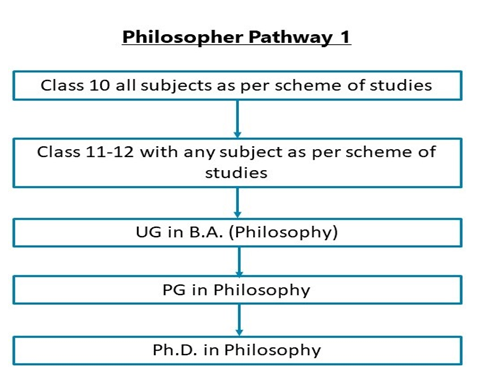
After your Class 10 all subjects as per scheme of studies, you can study Class 11-12 with any subject as per scheme of studies and then study for an undergraduate degree in Philosophy / similar subject (Honours or specialisation is an advantage) followed by a master’s degree in Arts stream in Philosophy. After a Master’s Degree, you can take a Ph.D. in Philosophy.
Class 10 all subjects as per scheme of studies - Class 11-12 with any subject as per scheme of studies – UG in B.A. (Philosophy) – PG in Philosophy
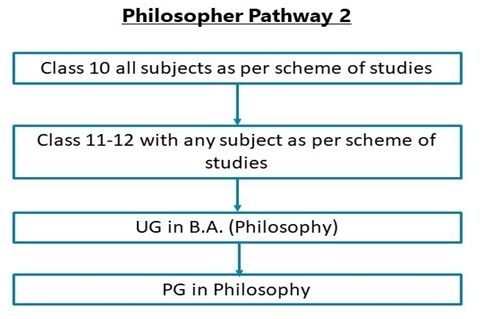
After your Class 10 all subjects as per scheme of studies, you can study Class 11-12 with any subject as per scheme of studies and then study for an undergraduate degree in Philosophy / similar subject (Honours or specialisation is an advantage) followed by a master’s degree in Arts stream in Philosophy.
Class 10 all subjects as per scheme of studies - Class 11-12 with any subject as per scheme of studies – UG in B.A. (Philosophy) – PG in Philosophy – M.Phil. in Philosophy
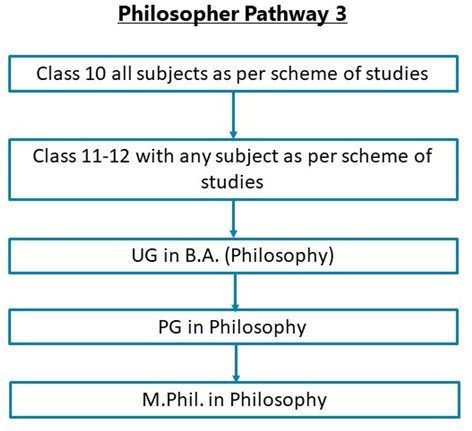
After your Class 10 all subjects as per scheme of studies, you can study Class 11-12 with any subject as per scheme of studies and then study for an undergraduate degree in Philosophy / similar subject (Honours or specialisation is an advantage) followed by a master’s degree in Arts stream in Philosophy. Now you can study for an M.Phil. degree in Philosophy.
Required Qualification & Competencies
To become a Philosopher, you can study for a Bachelor degree in Philosophy or a degree in Liberal Arts with a concentration in Philosophy or a related field. Then you should do a Master’s degree in any one of the following fields:
1. Ancient and Medieval Philosophy
2. Epistemology
3. Ethics
4. Logic
5. Modern Philosophy
6. Philosophy
7. Philosophy of Religion
MINIMUM EDUCATION REQUIRED | MAXIMUM EDUCATION REQUIRED |
Post Graduate Postgraduate Degree / Diploma / Certificate Programs for which the minimum eligibility is a pass in Graduation / equivalent Diploma program like Honours Diploma or Graduate Diploma. | Post-Doctoral Post Ph.D. programs for which the minimum eligibility is a Doctoral degree. |

Competencies Required
Interests
1. Investigative: You should have interests for Investigative Occupations. Investigative occupations involve working with ideas and quite a lot of thinking, often abstract or conceptual thinking. These involve learning about facts and figures; involve use of data analysis, assessment of situations, decision making and problem solving.
2. Artistic: You should have interests for Artistic Occupations. Artistic occupations mostly involve working with creative ideas, art and designs. These occupations involve abstract or conceptual thinking, creative self-expression and often do not follow any set processes or rules for getting things done.
3. Social: You should have interests for Social Occupations. Social occupations involve helping or assisting others; these involve working with and communicating with people to provide various services; these may involve educating and advising others.
Abilities
1. Abstract Reasoning: The ability to understand ideas which are not expressed in words or numbers; the ability to understand concepts which are not clearly expressed verbally or otherwise.
2. Deductive Reasoning: The ability to apply general rules and common logic to specific problems to produce answers that are logical and make sense. For example, understanding the reasons behind an event or a situation using general rules and common logic.
3. Emotional Intelligence: The ability to understand your own and others' emotions and feelings; empathy for others; adjusting your behavior or self-control and self-regulation according to others' emptions and situations.
4. Fluency of Ideas: The ability to come up with a number of ideas about a topic (the number of ideas is important, not their quality, correctness, or creativity).
5. Inductive Reasoning: The ability to combine pieces of information from various sources, concepts, and theories to form general rules or conclusions. For example, analysing various events or situations to come out with a set of rules or conclusions.
6. Oral Comprehension: The ability to listen to and understand information and ideas presented through spoken words and sentences.
7. Oral Expression: The ability to communicate information and ideas in speaking so others will understand.
8. Verbal Reasoning: The ability to think and reason with words; the ability to reason out ideas expressed in words.
9. Written Comprehension: The ability to read and understand information and ideas presented in writing.
10. Written Expression: The ability to communicate information and ideas in writing so others will understand.
Knowledge
Philosophy and Theology: Knowledge of different philosophies and religions. This includes their philosophical principles, values, ethics, customs, practices, and their impact on human culture and civilization.
Skills
1. Active Learning: Focused and continuous learning from various sources of information, observation and otherwise for application in getting work done.
2. Critical Thinking: Skills in analysis of complex situations, using of logic and reasoning to understand the situations and take appropriate actions or make interpretations and inferences.
3. Judgment and Decision Making: Skills in considering pros and cons of various decision alternatives; considering costs and benefits; taking appropriate and suitable decisions.
4. Reading Comprehension: Skills in understanding written sentences and paragraphs in work related documents.
5. Teaching: Skills in teaching and educating others about various academic and applied subjects across different academic fields.
6. Writing: Skills in communicating effectively in writing as appropriate for the needs of the readers.
Personality
1. You are a soft-hearted person sometimes.
2. You trust others sometimes but not always.
3. You are helpful to others sometimes.
4. You are self-satisfied sometimes but some other times you don't feel satisfied with your life and situations.
5. You are imaginative sometimes.
6. You prefer to experience new things and have new experiences sometimes.
7. You act independently sometimes but do not do so in some other times.
8. You are caring, supportive, sympathetic and kind to others sometimes.
Career - Job Opportunities & Profiles
1. Most of the universities and college (including few IITs) will hire you as a professor at the position of Junior Professor or Assistant Professor.
2. You may join as programme officers at the Indian Council of Philosophical Research.
3. If you are into research, then you will be hired at the position of research associate.
You will find career opportunities at these institutions:
1. Embassies and their cultural departments and organizations.
2. NGOs. Working on philosophical studies and humanitarian services.
3. Colleges and Universities teaching Philosophy.
4. Politics, Public Administration, Public Policies related research companies and policymakers.
5. Schools, Colleges and Universities (including IITs).
Work Environment
Philosophers typically work in an office. However, while working on the research, you might be required to move into the field for completing research. Most of the time you will work for regular working hours only. As a philosopher, if you are working in public administration, civil service, you may need to spend most of the time working for people and many times you will be working over and above official time.
Specialisation Tracks In This Career
1. Epistemologists
Epistemologists are the philosophical experts who study the putative sources of knowledge, including intuition, a prior reason, memory, perceptual knowledge, self-knowledge and testimony. As an epistemologist, you will try to seek the truth. You will research knowledge to go deeper into it.
2. Metaphysicist
Metaphysicist is a philosopher expert who researches about the features of reality like existence, time and objects. They study cosmology and work on the relation between mind and body through it.
Career Growth
1. The career growth in university and college states from Assistant Professor and then Associate Professor, Professor and Professor Emeritus. Professors can also get administrative positions such as Director/Dean/Vice Chancellor, etc.
2. If you are hired as a research associate (JRF and SRF), then you will go on to become a Doctoral Research Fellow, then Post-Doctoral Research Fellow and then Scientist in Progressive Grades.
Salary Offered
1. At the entry level, you can join as a research associate with a basic salary of Rs. 25,000 to 30,000. As a doctoral research fellow (junior research fellow) you would be earning around Rs. 35,000 to 38,000 per month. As an assistant professor, you would be earning anything between Rs. 55,000 to 60,000 per month.
2. At the junior level with a work experience of 2-6 years, you would be earning anything between Rs. 80,000 to 1,20,000 per month.
3. At the middle level with an experience of 10-12 years, you would be earning anything between Rs. 1,00,000 to 2,00,000 per month.
4. At the senior level of over 15 years of work experience, you would be earning anything between Rs. 1,20,000 to 2,25,000 per month.
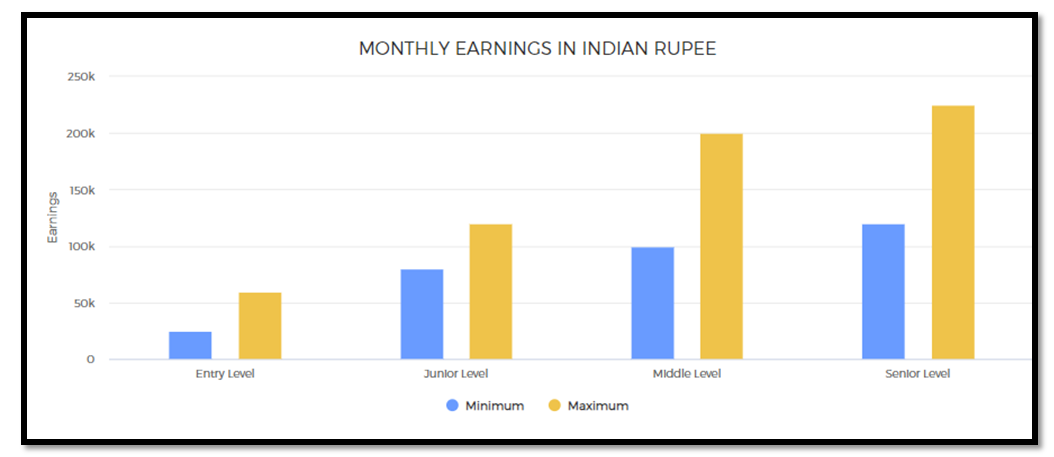
Monthly Earnings In Indian Rupee
Entry Level | Junior Level | Mid Level | Senior Level | ||||
Min Earning | Max Earning | Min Earning | Max Earning | Min Earning | Max Earning | Min Earning | Max Earning |
25000 | 60000 | 80000 | 120000 | 100000 | 200000 | 120000 | 225000 |
1. Entry level: 0 - 2 years of work experience
2. Junior Level: From 1 to 12 years of work experience
3. Mid Level: From 5 to 20+ years of work experience
4. Senior Level: From 10 to 25+ years of work experience (there could be exceptions in some high-end technical, financial, engineering, creative, management, sports, and other careers; also in the near future, people will reach these levels much faster in many careers and in some careers, these levels will have no meaning as those careers will be completely tech skill driven such as even now, there is almost no level in a Cyber Security Expert’s job)
Work Activities
1. Creative thinking: Developing new ideas, concepts, innovative solutions to problems, newer ways of getting things done, designing products and services, creating work of art and craft, etc.
2. Decision making and problem-solving: Analysis of data and information; evaluation of alternative decisions and results of decisions; taking the right decisions and solving problems.
3. Getting Information and learning: Observing, hearing, reading, using computers, or otherwise obtaining information and learning from it.
4. Providing advice and consultation to others: Giving advices or consultation to others about various issues, conceptual matters, know-hows, scientific matters, products or services.
5. Training and teaching: Understanding educational and training needs of others, developing training programs and educational programs, conducting training programs, teaching and instructing others.
6. Updating and using relevant knowledge: Keeping updated with the latest knowledge relevant to your fields of work and use of the relevant knowledge in getting things done.
7. Using computers for work: Using computers for day-to-day office work; using computer software for various applications in day-to-day professional work; entering data and process information; for writing.
Future Prospects
For a Philosopher, most of the job opportunities are in the education sector, government sector, NGOs, Cultural societies, and sociopolitical thinktank organizations. Jobs with NGOs, Cultural societies, Civil Services and Government jobs are not market dependent, and the scopes are with limited growth. Although the education sector has been growing by leaps and bounds over the past couple of decades, but Humanities does not offer many teaching opportunities.
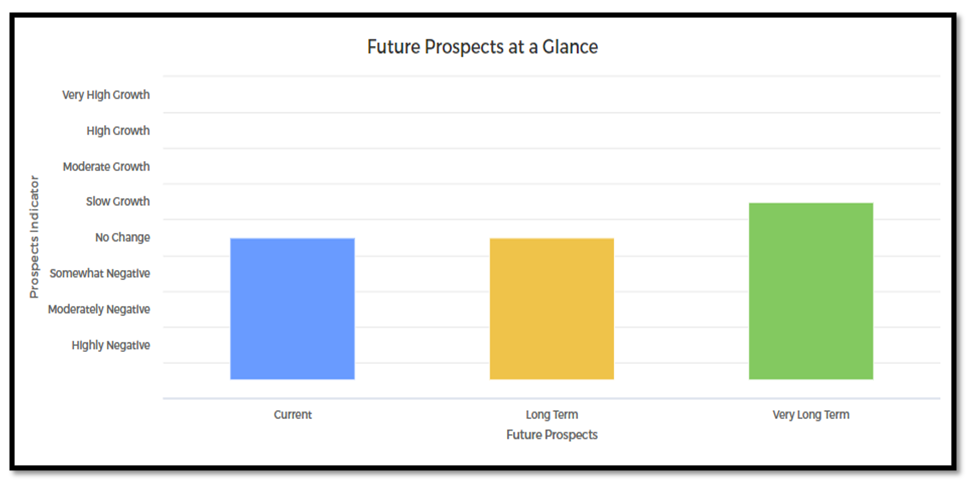
Future Prospects At A Glance
Current (0-1 year) | Long Term (2-5 year) | Very Long Term (6-10 years) |
No Change | No Change | Slow Growth |


